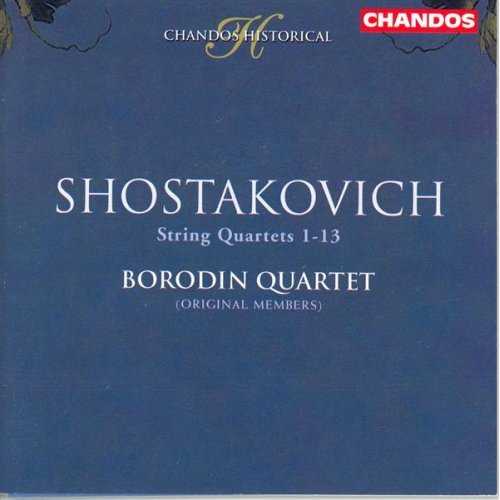
Performer: Borodin Quartet: Rostislav Dubinsky, Yaroslav Alexandrov, Dmitry Shebalin, Valentin Berlinsky
Audio CD
SPARS Code: ADD
Number of Discs: 4
Format: FLAC (image+cue)
Label: Chandos
Size: 1.3 GB
Recovery: +3%
Scan: yes
CD 01
Shostakovich String Quartet No.1, Op.49 in C major
01.”I. Moderato”
02.”II. Moderato”
03.”III. Allegro molto”
04.”IV. Allegro”
Shostakovich String Quartet No.3, Op.73 in F major
05.”I. Allegretto”
06.”II. Moderato con moto”
07.”III. Allegro non troppo”
08.”IV. Adagio”
09.”V. Moderato”
Shostakovich String Quartet No.12, Op.133 in D flat major
10.”I. Moderato”
11.”II. Allegro – Adagio – Moderato – Adagio – Moderato – Allegretto”
CD 02
Shostakovich String Quartet No.4, Op.83 in D major
01.”I. Allegretto”
02.”II. Andantino”
03.”III. Allegretto”
04.”IV. Allegretto”
Shostakovich String Quartet No.5, Op.92 in B flat major
05.”I. Allegretto non troppo”
06.”II. Andante”
07.”III. Moderato – Allegretto”
Shostakovich String Quartet No.6, Op.101 in G major
08.”I. Allegretto”
09.”II. Moderato con moto”
10.”III. Lento”
11.”IV. Lento – Allegretto”
CD 03
Shostakovich String Quartet No.7, Op.108 in F sharp minor
01.”I. Allegretto”
02.”II. Lento”
03.”III. Allegro – Allegretto”
Shostakovich String Quartet No.8, Op.110 in C minor
04.”I. Largo”
05.”II. Allegro molto”
06.”III. Allegretto”
07.”IV. Largo”
08.”V. Largo”
Shostakovich String Quartet No.9, Op.117 in E flat major
09.”I. Moderato con moto”
10.”II. Adagio”
11.”III. Allegretto”
12.”IV. Adagio”
13.”V. Allegro”
Shostakovich String Quartet No.11, Op.122 in F minor
14.”I. Introduction. Andantino”
15.”II. Scherzo. Allegretto”
16.”III. Recitative. Adagio”
17.”IV. Etude. Allegro”
18.”V. Humoresque. Allegro”
19.”VI. Elegy. Adagio”
20.”VII. Finale. Moderato”
CD 04
Shostakovich String Quartet No.2, Op.68 in A major
01.”I. Overture. Moderato con moto”
02.”II. Recitative and romance. Adagio”
03.”III. Waltz. Allegro”
04.”IV. Theme with Variations. Adagio”
Shostakovich String Quartet No.10, Op.118 in A flat major
05.”I. Andante”
06.”II. Allegretto furioso”
07.”III. Adagio”
08.”IV. Allegretto”
Shostakovich String Quartet No.13, Op.138 in B flat minor
09.” Adagio – Doppio movimento – tempo primo”
borodin_quartet_shostakovich_string_quartets02.rar – 330.9 MB
borodin_quartet_shostakovich_string_quartets03.rar – 317.3 MB
borodin_quartet_shostakovich_string_quartets04.rar – 334.8 MB
From Fanfare Magazine (US) Sept/Oct 2003 Art Lange
“Be careful, they say, what you wish for–you might get it. Well, this is an occasion when I am most grateful I asked. Back in Fanfare 25:5, reviewing a disc of Shostakovich string quartets by the Sorrel Quartet, I mentioned that to my knowledge the incomplete cycle of quartets recorded by the original Borodin Quartet (1953-74) had not been released on CD. (Issued in Russia on Melodiya LPs, quartets 1-11 were available for years here in two budget-priced Seraphim boxes, which is how I came to first, hear, own, and appreciate this music.) Now, only a year later, here it is, with the valuable addition of numbers 12 and 13. Violinists Rostislav Dubinsky and Yaroslav Alexandrov left the group before they could record Shostakovich’s then-recent, final two quartets; however, the “new” Borodin Quartet, with violinists Mikhail Kopelman and Andrei Abramenkov, did record all 15 quartets (available on EMI) as well as several individual subsequent remakes. The sound of these “historical” (as Chandos designates them) recordings is primarily fine, with some ever-so-slight constriction at a very few climaxes, and just a trace of analog tape background hiss here and there–but nothing to get in the way of the listening experience. And I’m pleased to report that these performances are even better than I remember from my distant, hazy vinyl past–in fact they are among the very best currently available.
The major differences between the old and new Borodin accounts have to do with temperament and tonal qualities. There’s plenty of characteristically Russian expressiveness in the earlier versions, with more vibrato than that used by non-Russian ensembles like the Fitzwilliam and Emerson, and recognizably “vocal” phrasing given to much of the folk-inspired (or quoted) melodic writing. But the later Borodin is even more exaggerated, which can be dramatically effective (as in portraying the deeply passionate No. 8, or the nearly immobile, enigmatic qualities of No. 13), but sometimes bathes the music in pathos. The original Borodin inevitably takes quicker tempos, though seldom as fast as, again, those of the Emerson or Fitzwilliam. The Emerson, for example, envisions the second movement of No. 8 (Shostakovich’s impressions of war-torn Dresden) as a whirlwind, with ripping and hammering accents like an angry Fate intent on destruction, where the original Borodin pace themselves, adapting tonal modifications–the dry tone of the first violin, or highlighting a cello line–to ease the listener into their world. On countless occasions, first violinist Dubinsky finds just the right tone to create the proper mood–sometimes acidic, sometimes melancholy, sometimes jaunty–and bring out the flavor of the material. He can be flamboyant, as in the finale of the first quartet, where the foursome romp through the music, or emphasize the thematic and emotional dissonances in No. 2’s second movement elegy. In No. 7, dedicated to the memory of Shostakovich’s first wife, beginning at reference point 9 his ominous pizzicato is like a dance by the Angel of Death (with painful stabbing accents), which turns seductive in the muted arco opening the second movement, before triggering a frenzy of motion in the third movement.
Though these Borodins are very good at varying the similarities of expressive style (Shostakovich’s fingerprints) that tie the quartets together as a single body of work, as might be expected, not every episode is equally convincing. For example, in No. 9 the first movement tempo seems a little rushed and the balances askew, and elsewhere they can’t quite make the disparate events cohere; the normally disturbing No. 13 seems a touch too poised and under control, and the percussive taps come off as neither spooky nor a spontaneous emotional gesture but rather a calculated coloristic effect. On the other hand, they build enormous momentum in the quasisymphonic pages of climactic acceleration in No. 2, and tighten the rhythms and dig in to create an edgy tension in No. 4 and No. 5. No matter where Shostakovich’s troubled mindset may lead, nothing comes off as over-italicized or undernourished. All things considered, this is a distinguished and distinctive set of performances that provides convincing insight into the music. Don’t be put off by the lack of the final two quartets; what is here is a brilliant achievement, and highly recommended.”
*** I really treasure this set (along with the timeless Fitzwilliam Shostakovich: The String Quartets; the performances are nonpareil, the sound is excellent, and the Borodin’s authority in this music is indisputable. One interesing note in the Chandos 2003 booklet – they don’t know when these performances were recorded. In fact, they ask listeners to write them with any information about the provenance and date of the recordings. An odd admission for any record label, but Chandos has always been a cut-above the competition. *** HIGHLY RECOMMENDED.
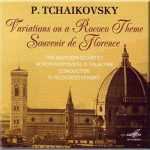
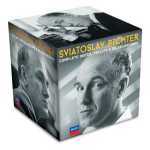
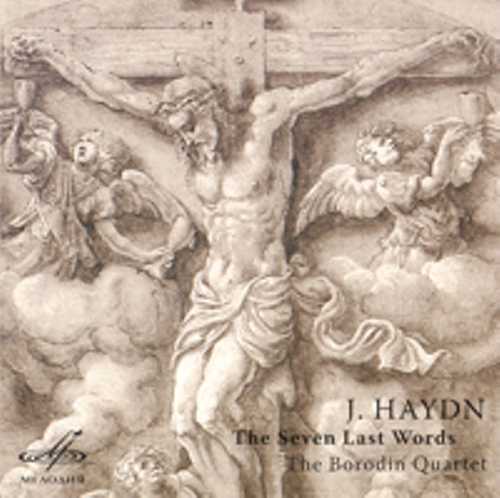
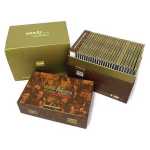
Thank!
To frieda3076:
This gift from Whatever is not what you heard 13 years ago in Moscow. It is the version of the older Borodin Q (Dubinsky, Alexandrov, Shebalin, Berlinsky), quite difficult to find today on the net, I think the best Borodin Q version. Jules
Of course I meant only the string quartets, can’t remember who played though but one of the best Moscow memories for me – apart from the chocolate from the Red October factory!
Thank you, Whatever! Thank You! Thank you! Thank You! Jules
Ah..I heard them all live when I was in Moscow 13 years ago. Marvellous!
Thank you!
Спасибо, Товарищ!
да не за что, Товарищ ;)